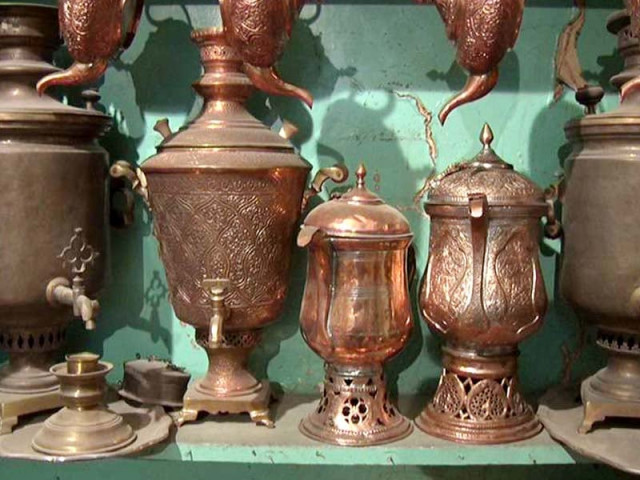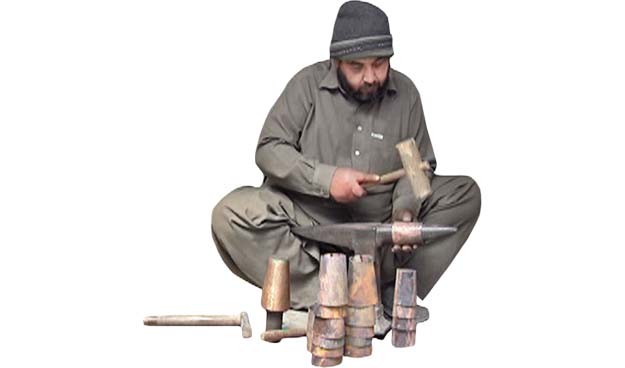Offbeat: Inside the world of K-P’s dying brass craft
Due to the escalation of price, it became almost impossible for middle-income families to afford brass items

PHOTOS: EXPRESS
“I spent my whole life creating different items with brass and finally the government recognised my work,” said Safar, who was recently nominated for the Pride of Performance Award by the President of Pakistan.
Talent runs in his blood, as his late elder brother Khwaja Akhter Ali was also nominated for the award in 1968 as well as in 1979.
Speaking to The Express Tribune, Safar Ali said that his family has been associated with the craft for the past 147 years.
“In May 2005, Hollywood actress Angelina Jolie came to Peshawar and visited our shop. She commended our hard work and wrote in our log book, “beautiful shop and wonderful man” Safar Ali recalled.
He also said that many other celebrities and politicians have paid a visit to his shop including the American vice president, princes of Thailand, the prime minister of Lebanon, Hafeez Jalandhari, Faiz Ahmad Faiz, and Habib Jalib, among others.
Akin to Khwaja Safar Ali, Khadim Hussain, 60, is another brass craft expert who works in his own small-scale factory. While speaking to The Express Tribune, he could be seen working his magic on a raw piece of brass to turn it into a decoration piece.
“Starting at the age of 10, I have devoted my whole life to this craft. I have passed on the skill to two of my grandsons who will continue with this profession. This is what my forefathers did. And my future generations will continue this family legacy,” the old man said while holding on to his walking stick.

Hussain explained that his father Haji Fazal Mahmood built his small brass factory in 1948 –a year after the independence of Pakistan.
“He used to create many daily-use items with brass and they used to be exported to various parts of the country as well as abroad,” Hussain elaborated, adding that after the death of his father in 1999, he took over the business.
He further explained that many factory workers, who were skilled at brass craft, later started making plastic and silver items because of the skyrocketing prices of brass.
“Prices of brass escalated, so much so that it became almost impossible for middle-class families to afford items made up of the metal,” he said.
“Before the Afghan War of 1979, many foreigners used to frequent our factory to purchase brass crafts. Later, however, regional instability, including the War on Terror, adversely affected our business. As a result, not only foreigners stopped visiting but locals also stopped buying brass items because of the resultant poverty,” Mahmood said.
He further said that one kilogram of brass costs Rs1050 while handwork and artwork that goes into each showpiece increase the price up to Rs5000 which not affordable for someone hailing from a moderate background,” Khadim Hussain added.
He further said that Bazaar-e-Misgrah – a well-known copperware bazaar located in Peshawar’s Qissa Khwani Market used to be full of brass items back in the days but because of the price hike, it has now only been reduced to a place selling decoration pieces.
“There are not even many brass craftsmen here anymore as most shopkeepers import items from different places,” Hussain said.
Speaking to The Express Tribune, Director Culture Khyber-Pakhtunkhwa Mahmood Khan said that the government desperately wants to revive the dying culture of Khyber-Pakhtunkhwa.
“[Per the plans of the government], an artisan village will be set up a Nishter Hall Peshawar with an initial cost of Rs40 million. As the PC-1 of the project has been approved, it will be soon presented in a cabinet meeting and will be passed by the assembly”, Mahmood Khan said.
He further added that in the Artisan Village, handicraft work from Khyber-Pakhtunkhwa will be displayed and artists and craftsmen from across the province will be able to present their work.
“The initiative will not only help revive the culture and art of K-P but it will also provide business incentives to craftsmen,” he said. “It is a sad reality that our new generation has gradually lost interest in art and culture, therefore, this initiative will also provide an opportunity to the youth to know about their rich heritage and culture.”
Although the government has positive initiatives to take, Khwaja Safar Ali looks at it from a different perspective.
“The government initiates such programmes [without long-term and sustainable goals] and after a while, when they run out of funds, the project comes to a halt and people lose their jobs,” he said.
Published in The Express Tribune, April 14th, 2019.






1724319076-0/Untitled-design-(5)1724319076-0-208x130.webp)












COMMENTS
Comments are moderated and generally will be posted if they are on-topic and not abusive.
For more information, please see our Comments FAQ